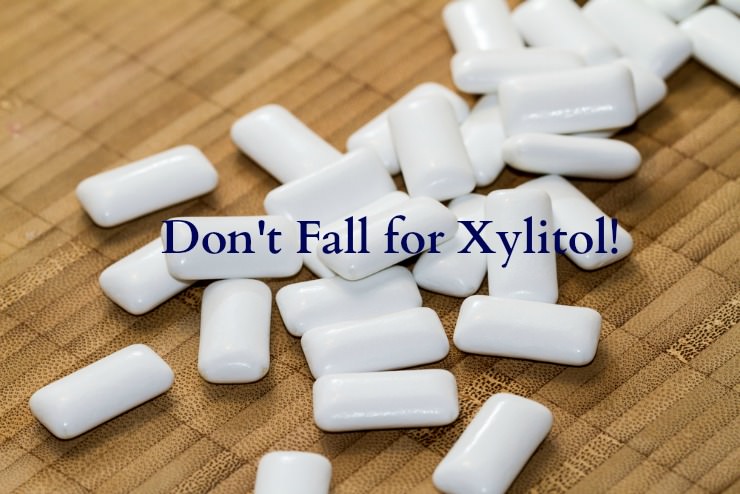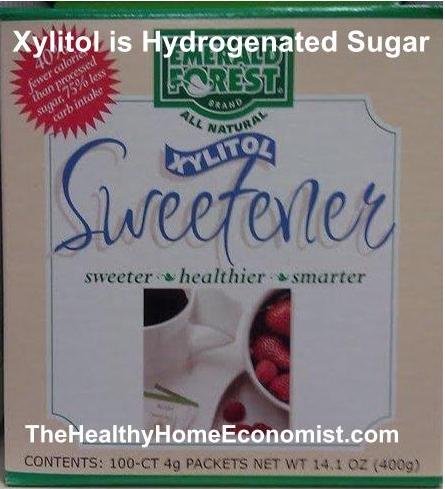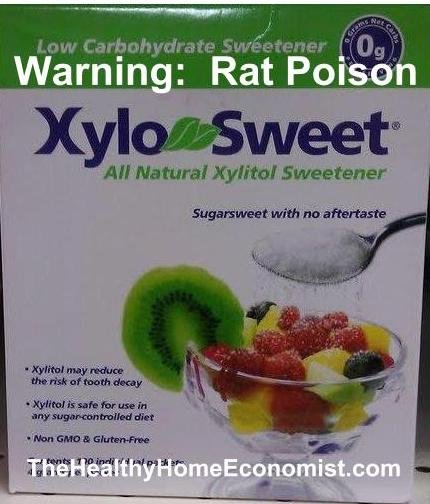
Xylitol is truly the darling of sugar substitutes today. The American Dietetic Association touts its use, with this sugar alcohol sold alone and as a sweetener in a variety of processed foods. Health benefits include a reduced glycemic response compared with sucrose, increased absorption of B vitamins and calcium, and even a reduction in dental caries risk.
Consequently, people with blood sugar issues are flocking to processed foods containing this alternative sweetener as a way to satisfy that sweet tooth without the downside of exacerbating the risk factors for Metabolic Syndrome. This condition is known for the markedly increased likelihood of developing heart disease, stroke, and type 2 diabetes.
Even the healthfood community almost universally considers this sugar alcohol to be a healthy substitute for sugar. A primary reason is that it doesn’t directly contribute toward the growth of intestinal yeasts aka Candida.
Have you noticed that the check out aisles at health food stores are typically loaded with chocolates and other sweets containing at least some xylitol? The truth is that I have yet to talk with any health-conscious person who suggests to me any downside other than the potential for intestinal cramps if you get too much.
Xylitol is Naturally Found in Nature
Xylitol is, after all, a naturally occurring substance. Manufacturers of xylitol market it as derived from xylan. The fibers of many plants contain it, including berries, oats, beets, sugar cane and birch. Sounds pretty harmless at first glance.
The FDA has even granted xylitol GRAS (Generally Recognized As Safe) status. You can’t get any safer than that, right?
 Manufacturing Process
Manufacturing Process
It is true that xylitol is a naturally occurring substance. However, manufactured xylitol is another matter entirely. Food manufacturers produce it using the industrialized process of sugar hydrogenation. In order to hydrogenate anything, a catalyst is needed. In this case, Raney nickel is used which is a powdered nickel-aluminum alloy. (1, 2)
This poses the risk of heavy metal residue and contamination. Nickel, by the way, is a recognized carcinogen and aluminum is associated with the development of dementia. Heavy metals in the body are notoriously difficult to eliminate with frequent use of infrared sauna probably a good idea.
This alternative sweetener doesn’t seem quite so warm and fuzzy anymore, does it?
There is currently no literature on any detrimental health effects of consuming hydrogenated sugar. However, food manufacturers widely used hydrogenated fats for decades before the very damaging effects of cardiovascular health became widely known!
Given the violent industrialized process that is required to produce a hydrogenated sugar like xylitol, it would seem wise to avoid it based on the very poor track record of hydrogenated foods in general.
Most Xylitol Sourced from GMO Corn
While it is true that xylitol can be derived from the xylan of birch trees, xylan is also found in corn cobs. It is much cheaper to use corn instead of birch bark to derive xylitol and so what do you think manufacturers prefer? Corn, of course.
Therefore, unless the label of a xylitol-containing product specifically notes that it is from birch or another nonGMO source, xylitol is very likely from genetically modified corn or possibly GMO sugar beets.
This is the same problem as high fructose corn syrup (HFCS) and white sugar from beets. Food manufacturers rely heavily on these sweeteners in the production of sodas and sports drinks.
You get a dose of GMOs with every sip! More on GMO dangers including sterility and stomach holes at the provided link.
Usage Contributes to Gut Imbalance
The digestive process does not break down sugar alcohols like food. Rather, xylitol arrives intact into the intestines.
At that point, a process called “passive diffusion” takes place. This means that the xylitol draws water into the bowels. Only a partial breakdown is the end result. The unmetabolized portion ferments providing the perfect environment for undesirable bacteria to thrive and grow.
It is true that xylitol itself does not feed candida directly as sugar does. As a result, this artificial sweetener is even promoted as a useful part of the Candida Diet. Unfortunately, the fermentation of undigested xylitol in the gut most definitely can exacerbate yeast problems. Don’t be fooled by this argument!
This is exactly why consuming xylitol can make some folks so gassy and even trigger cramping and diarrhea. Gut pathogens having a heyday in your intestines give off a lot of smelly toxins!
Other Little Known Problems
Xylitol can contribute to acid reflux problems. As a result, those who have issues in this area should avoid it for that reason alone. Chronic acid reflux is a serious problem that can lead to cancer of the esophagus and larynx.
In addition, those who suffer from seizures of any kind should stay away from this alternative sweetener as it can increase the frequency of epileptic attacks.
Two Pieces of Xylitol Gum Can Kill a Rat?
According to unpublished lab tests, approximately 1.65 grams of xylitol kills a 100-gram rat half the time.
Two little pieces of xylitol gum contain about .7 – 1 gram. This is probably enough to meet the definition of rat poison.

Cavity Prevention
Many people are chewing xylitol gum due to compelling scientific evidence for cavity prevention. What about children, however?
Rami Nagel, author of Cure Tooth Decay, doesn’t even recommend xylitol gum for this purpose. His research for any long term safety data turned up the following:
- Epidemiology: No information found
- Teratogenicity: No information found
- Reproductive Effects: No information found
- Mutagenicity: No information found
- Neurotoxicity: No information found
In summary, using this modern substance officially renders you a guinea pig, my friend! It seems that any benefits of cavity prevention are outweighed by the fact that there is no actual safety data backing up its use.
Safe Uses of Xylitol
Given all the problems that consumption of xylitol can trigger, it seems best to bypass the use of this sugar substitute on a regular basis.
Can it ever be helpful? Does it have any benefits whatsoever?
Potentially so. The only time I personally would ever consider using xylitol is to help resolve a childhood ear or sinus infection in order to prevent the use of drug-based antibiotics.
There is evidence that this popular sugar alcohol can indeed help encourage a healthy balance of beneficial bacteria found in the ear canal and sinus cavities. Products like this incorporate xylitol for this purpose.
A therapeutic dose can help resolve infection in these areas quickly with no medication required.
Thus, if you choose to use it, make sure it is sparingly and therapeutically (not as food). Also, make sure it does not come from a GMO source like corn!
References
(1) Xylitol production via catalytic hydrogenation of sugarcane
(2) Catalytic hydrogenation of xylose to xylitol using ruthenium catalyst on NiO modified TiO2 support
(3) Cure Tooth Decay by Rami Nagel
(4) Sugar-Free Blues: Everything You Wanted to Know about Artificial Sweeteners
More Information
Yacon: Healthy Syrup or Healthfood Hype?
Jaggery: India’s Sweet Gift








After reading how xylitol is actually made, I came to the conclusion that it is NOT a safe substitute any sweetener. I tried it and really disliked the after-taste, gas/bloating and gut churning pain it caused. I have tried to stay away from this stuff, but have unintentionally consumed food containing it, and only after getting sick and further investing what I ate, discovered it contained xylitol. Stay away from this stuff – it is more bad news from so-called corporate science (not real science like we were taught in school).
Beets can be gmo also. Corn produced in the US is mostly genetically modified, but beets aren’t too far behind. Gmo beet sugar is used in everything. Birch will be your best bet, make sure it’s organic, and from a reliable source.
Thank you for the information
Posted by Dallas Wayne:
“I’ve spent a dozen days in the hospital over the last 8 months because of Xylitol. I’ve been sick every single day until now because I stopped using Ice Breakers (Xylitol).”
——–
Dallas, I Googled the ingredients of Ice Breakers and they don’t contain Xylitol. They do contain various other sugar alcohols along with the artificial sweetner Aspartame which is known to cause problems. (Along with various chemicals.)
I think a lot of people posting that they had problems with it are confusing it with other sweeteners, just like Dallas did.
Personally, I use it for teeth and gum health and it has been indispensable. I have also eaten it on occasion and never had a problem with it. Also, it helped my sister in law who had a severe Candida problem. We buy the Xylitol made from birch.
Thank you so much for the information you have provided me. I certainly appreciate it.
I haven’t yet tried xylitol but would just like to mention garlic as being absolutely fantastic for ear infection. Last time I had one I sliced a clove in half in the middle of the night and held it in the affected ear for about 20/30 mins. I felt like I could feel it working slowly and after about half an hour enough pain had been relieved that I managed to sleep. The next day my at felt so much better but slowly got more painful through the day, though not excruciating as the night before. I gave it another garlic dose after lunch and that was that. Infection gone.
How about you just don’t use it and see what happens before throwing it away hahaha? Besides even if you don’t get along with it, I am sure there would be someon who would be very grateful for it.
Xylitol is a simple chemical substance. It does not contain the DNA of corn so whether natural or genetically modified is irrelevant.
I’ve been having a lot of gum sensitivity lately. Although I’ve experimented with fluoride free toothpaste over the last year, I noticed one with xylitol made my teeth sensitive. I thought it was the hydrated silica that was just too abrasive. But lately I made a homemade version and added some xylitol for sweetness and for bacteria killing (or so I thought). Now I realize, it’s probably the xylitol. Throwing it out tonight and see what happens.
I think chewing xylitol inflamed my gums and caused an abscess. Lost a molar because of it.
I have never heard of Xylitol being derived from corn. My husband had nasopharyngeal cancer that required radiation. He was told that he would lose all of his teeth within a couple of years due to the intense radiation. They had him try xylitol gum and after 8 years he hasn’t had so much as a cavity. I also have chewed the gum for 8 years with no problems. My chronic ear infections are gone and my mouth is healthy. I have never experienced “gut” problems and neither hads anyone in my family. Animals cannot eat xylitol….they also cannot have chocolate, grapes and a host of other foods that humans eat. Rats dying from eating xylitol doesn’t mean anything. My dentist gives xylitol gum away free to her patients because it controls inflammation and plaque.
The lauded xylitol comes from the birch tree. All others have not been vetted, as far as I know. I haven’t investigated in a year, so I’m not up to date. As it became popular, manufacturers found cheaper versions, like using corn.